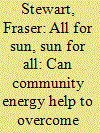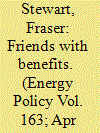| Srl | Item |
| 1 |
ID:
180176


|
|
|
|
|
| Summary/Abstract |
Can community energy help to overcome inequalities in who benefits from low-carbon technologies? Research has shown that the distribution of low-carbon technology subsidies and their associated benefits can be highly uneven across socioeconomic groups, revealing a persistent inequality issue. Yet this research has tended to focus almost exclusively on adoption of technologies at the household-level, with limited insights into whether and how this distribution might differ in the case of community energy. To address this, this paper quantitatively investigates the distribution of payments to household- and community-level energy systems across socioeconomic groups in Scotland under the UK government feed-in-tariff. Analysis is conducted on a novel dataset of 26,218 household and community wind and solar installations across 6,976 micro-level data-zones using a combination of distributional analysis and random effects within-between regression. It finds that feed-in-tariff payments for household-level wind and solar PV systems have heavily benefitted more affluent socioeconomic groups, while payments to community energy projects have flowed more consistently into areas of higher deprivation, particularly in the case of community solar. These findings suggest that community energy has been successful in bringing the benefits of low-carbon technologies to areas of lower income and higher deprivation, with important lessons for policymakers concerned with a just transition going forward.
|
|
|
|
|
|
|
|
|
|
|
|
|
|
|
|
| 2 |
ID:
183611


|
|
|
|
|
| Summary/Abstract |
What drives inequalities in the uptake of low-carbon energy technologies? Research has shown that people on higher incomes are significantly more likely to access and benefit from policies designed to boost uptake of clean energy technologies than those with lower incomes, revealing a pervasive inequality issue. Yet little is known about how these inequalities evolve or interact with factors beyond income alone, understanding of which is crucial to designing policies which do not simply replicate or exacerbate existing inequalities going forward. This paper thus advances the novel “feed-in-tariff trap” theory, which posits that, rather than income alone, peer diffusion and socioeconomic factors compound to widen inequalities in the uptake of low-carbon technologies over time. Using a combination of mixed effects and piecewise structural equation modelling, this theory is tested on the adoption of 21,206 household-level wind and solar PV installations across 6976 micro-level data-zones in Scotland between 2009 and 2020 under the UK government feed-in-tariff. It finds crucially that: (1) household solar PV and wind are adopted consistently in higher-income areas, (2) peer diffusion is strongest in higher income areas with high early adoption rates, and (3) socioeconomic conditions are extremely temporally stubborn. Combined, this trifecta creates an inequality “trap”, locking the benefits of low-carbon technology subsidies into the same higher income areas and widening the gap in uptake between more affluent and deprived communities as a result. Recommendations are given on how best to address this, with implications for anyone concerned with a “just” transition going forward.
|
|
|
|
|
|
|
|
|
|
|
|
|
|
|
|